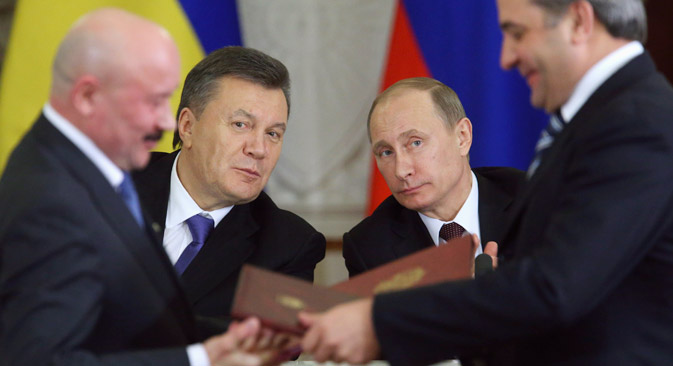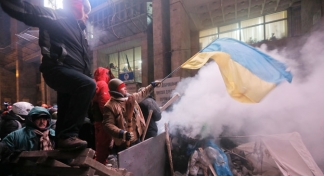Ukraine’s economic lifeline: What's in it for Russia?

Experts say Putin's decisions are saving the Ukrainian economy. Source: Reuters
Russian President Vladimir Putin's announcement on Dec. 17 that Russia would buy $15 billion's worth of Ukrainian eurobonds has already made a positive impact on the price of the Ukrainian credit default swaps. As a result, the risk of Ukraine defaulting on sovereign bonds has decreased from the recent 53.3 percent.
"Putin's decisions are saving the Ukrainian economy, at least for a while," said Konstantin Simonov, the head of Russia's National Energy Security Fund.
Related:
Gas deal signed with Tymoshenko-led goverment was economically justified - Putin
Russia to invest $15 bln in Ukrainian government securities - Putin
"Ukraine is edging away from the brink of an abyss. Russia has certainly postponed the default risk by several months.”
Simonov said both the $15 billion in investments and the gas discount are huge bonuses, and shaving $135 off the price per 1,000 cubic meter of gas, at Ukraine's current consumption level of nearly 33 billion cubic meter (the 2012 figure), is going to save Kiev $3 billion a year.
Oleksandr Stoyan, a member of Ukrainian parliament, said he believes the Russian money will help revive Ukraine's major economic sectors.
Russia's benefits
Many Russian experts polled by RBTH said their first reaction to the Kremlin's decision to invest in Ukrainian europbonds was a surprise. It later transpired, however, that the money would be invested in Ukrainian securities traded on the Irish Stock Exchange, meaning that the associated risks would be quite low.
Expert Maksim Petronevich with Gazprombank's Centre for Economic Forecasting, said he believes this may turn out to be a fairly beneficial investment for Russia, with the profitability of the eurobonds at 5 percent to 8 percent per year.
There are, however, questions about the gas discount: no specific supply figures at the new discounted price have been announced. Under the 2009 contract, Kiev must buy 40 billion cubic meters of Russian gas per year, but at present Ukraine is buying no more than 30 billion.
"If Ukraine will be made to buy more Russian gas, then it will gain nothing from the discount because it will be paying the same, or even more, than now," said Volodymyr Omelchenko, an expert at the Ukrainian think tank Razumkov Centre.
"In addition, the low price of Russian gas will undermine Ukraine's current projects to reverse natural gas from Europe and develop its own shale gas deposits, because these will be rendered unprofitable."
In addition Putin, a pragmatic politician who is not known to have given any discounts in the past, must have ensured that Ukraine will observe Russia's interests, Simonov said.
"There must be a hidden benefit for Russia, which isn’t being announced now, so that Ukrainian President Viktor Yanukovych can save face and demonstrate to the Ukrainian people that Russia is, after all, much more valuable for the country than the European Union. But in a while, the main two issues will certainly surface at some point."
The first issue is that Gazprom must have secured the right to participate in the sale of Russian gas to Ukrainian end users, Simonov said. If this is true, then the Russian exporter could make up for the money lost to the discount.
At present, Russian natural gas is sold to end users in Ukraine by the state-owned corporation Naftohaz, and by private companies belonging to Ukrainian tycoons Dmytro Firtash and Serhiy Kurchenko. Gazprom could set up a joint venture with one of these private companies to sell Russian gas to end users, Simonov suggested.
Russia's second possible gain is that it may take control over the Ukrainian gas pipeline system.
"I do not rule out the possibility of Yanukovych promising to sell the country's pipeline system to Russia,” Simonov said.
"I think that these two [possible under-the-counter agreements] are much more important than [the prospects of Ukraine joining] the Customs Union. If Russia takes over the Ukrainian gas pipeline system, [any Ukrainian government] will find it difficult to renege on the deal. After all, Ukraine has stuck to the much-hated [gas price] contract of January 19, 2009, rather than walking out on it. Therefore, if a gas transport system deal gets struck while Yanukovych is in power, any subsequent Ukrainian president will find it hard to go back on it. By contrast, Ukraine has demonstrated that reneging on a formal alliance is not that hard at all. Kiev could join the Customs Union today and walk out on it tomorrow."
First published in Russian in Vzglyad.
All rights reserved by Rossiyskaya Gazeta.
Subscribe
to our newsletter!
Get the week's best stories straight to your inbox

